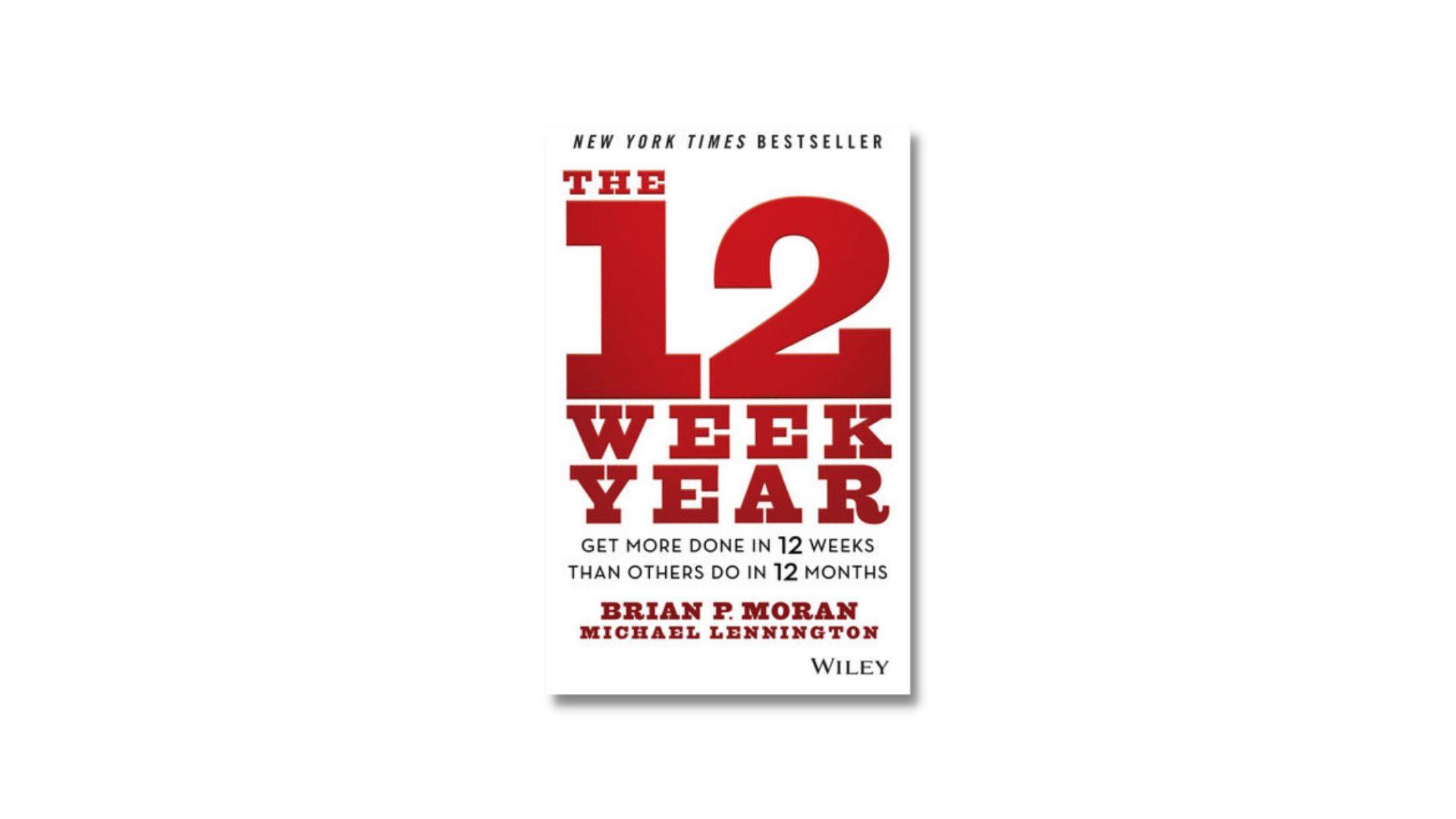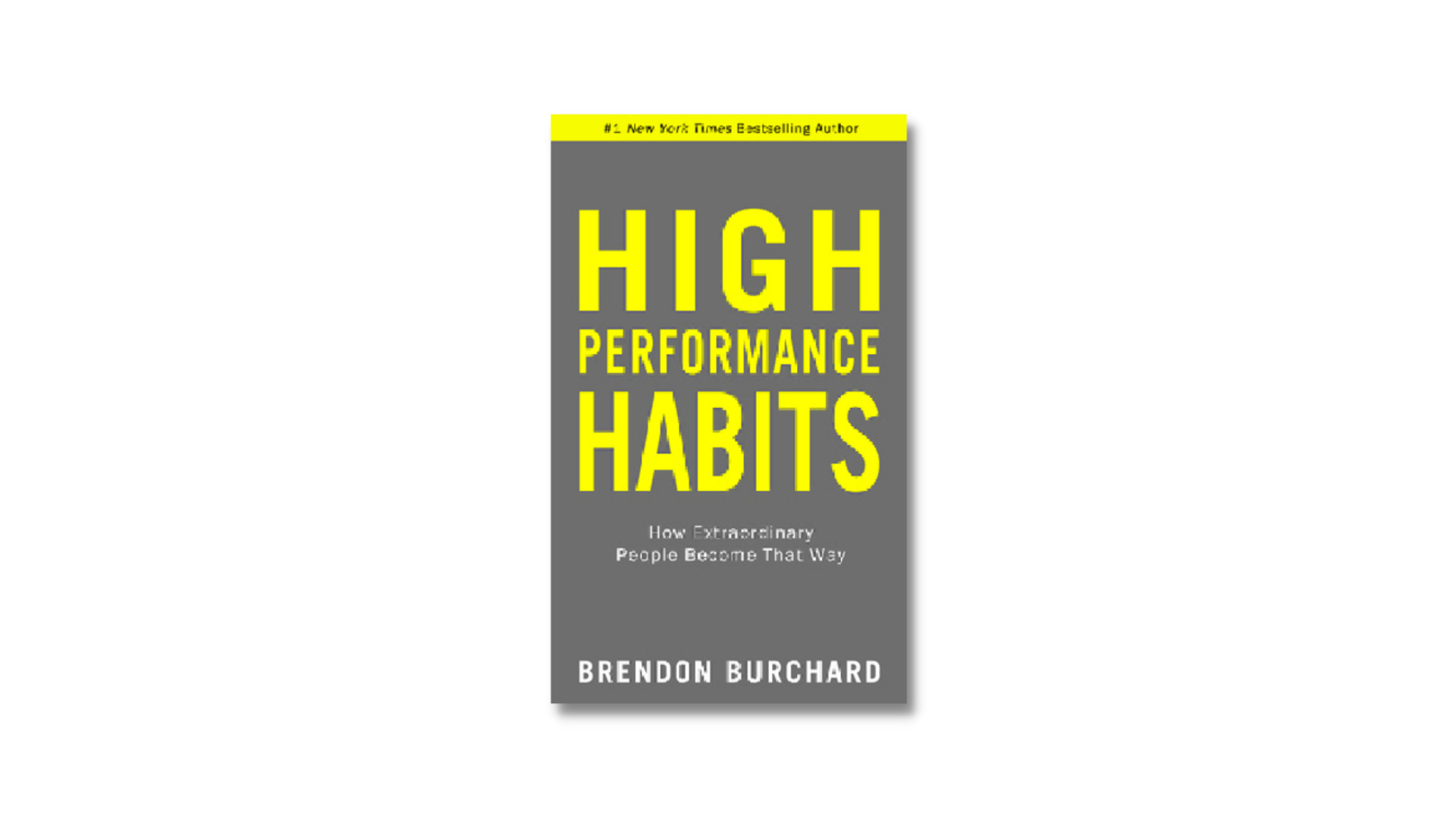Top 10 Must Reads for 2022

ON HIGH PERFORMANCE
The 12 Week Year
Get More Done in 12 Weeks Than Others Do in 12 Months
By Brian Moran and Michael Lennington (2013)
The guide to shortening your execution cycle down from one year to twelve weeks
Most organizations and individuals work in the context of annual goals and plans; a twelve-month execution cycle. Instead, The 12 Week Year avoids the pitfalls and low productivity of annualized thinking. This book redefines your "year" to be 12 weeks long. In 12 weeks, there just isn't enough time to get complacent, and urgency increases and intensifies. The 12 Week Year creates focus and clarity on what matters most and a sense of urgency to do it now. In the end more of the important stuff gets done and the impact on results is profound.
- Explains how to leverage the power of a 12 week year to drive improved results in any area of your life
- Offers a how-to book for both individuals and organizations seeking to improve their execution effectiveness
- Authors are leading experts on execution and implementation
Turn your organization's idea of a year on its head, and speed your journey to success.
Getting Things Done
The Art of Stress-Free Productivity
By David Allen (2001)
In today's world, yesterday's methods just don't work. In Getting Things Done, veteran coach and management consultant David Allen shares the breakthrough methods for stress-free performance that he has introduced to tens of thousands of people across the country. Allen's premise is simple: our productivity is directly proportional to our ability to relax. Only when our minds are clear and our thoughts are organized can we achieve effective productivity and unleash our creative potential. In Getting Things Done Allen shows how to:
- Apply the "do it, delegate it, defer it, drop it" rule to get your in-box to empty
- Reassess goals and stay focused in changing situations
- Plan projects as well as get them unstuck
- Overcome feelings of confusion, anxiety, and being overwhelmed
- Feel fine about what you're not doing
From core principles to proven tricks, Getting Things Done can transform the way you work, showing you how to pick up the pace without wearing yourself down.
High Performance Habits
How Extraordinary People Become That Way
By Brendon Burchard (2017)
THESE SIX HABITS WILL MAKE YOU EXTRAORDINARY
After extensive original research and a decade as the world’s highest-paid performance coach, Brendon Burchard finally reveals the most effective habits for reaching long-term success. Based on one of the largest surveys ever conducted on high performers, it turns out that just six habits move the needle the most in helping you succeed. Adopt these six habits, and you win. Neglect them, and life is a never-ending struggle.
We all want to be high performing in every area of our lives. But how? Which habits can help you achieve long-term success and vibrant well-being no matter your age, career, strengths, or personality? To become a high performer, you must seek clarity, generate energy, raise necessity, increase productivity, develop influence, and demonstrate courage. This book is about the art and science of how to practice these proven habits.
If you do adopt any new habits to succeed faster, choose the habits in this book. Anyone can practice these habits and, when they do, extraordinary things happen in their lives, relationships, and careers.
Whether you want to get more done, lead others better, develop skill faster, or dramatically increase your sense of joy and confidence, the habits in this book will help you achieve it. Each of the six habits is illustrated by powerful vignettes, cutting-edge science, thought-provoking exercises, and real-world daily practices you can implement right now.
HIGH PERFORMANCE HABITS is a science-backed, heart-centered plan to living a better quality of life. Best of all, you can measure your progress. A link to a professional assessment is included in the book for free.
ON BUSINESS
Traction
Get a Grip on Your Business
By Gino Wickman
Do you have a grip on your business, or does your business have a grip on you? Don't let common problems and frustrations run you and your business. Get a grip and gain control with the Entrepreneurial Operating System. Inside Traction, you'll learn the secrets of strengthening the Six Key Components of your business. You'll discover simple yet powerful ways to run your company that will give you and your leadership team more focus, more growth, and more enjoyment. Based on years of real-world implementation in over 100 companies, the Entrepreneurial Operating System is a practical method for achieving the business success you have always envisioned. Successful organizations are applying it every day to run profitable, frustration-free businesses -- and you can too.
Who Not How
The Formula to Achieve Bigger Goals Through Accelerating Teamwork
By Dan Sullivan and Benjamin Hardy (2020)
The world's foremost entrepreneurial coach shows you how to make a mindset shift that opens the door to explosive growth and limitless possibility--in your business and your life.
Have you ever had a new idea or a goal that excites you... but not enough time to execute it? What about a goal you really want to accomplish...but can't because instead of taking action, you procrastinate? Do you feel like the only way things are going to get done is if you do them? But what if it wasn't that way? What if you had a team of people around you that helped you accomplish your goals (while you helped them accomplish theirs)?
When we want something done, we've been trained to ask ourselves: "How can I do this?" Well, there is a better question to ask. One that unlocks a whole new world of ease and accomplishment. Expert coach Dan Sullivan knows the question we should ask instead: "Who can do this for me?"
This may seem simple. And it is. But don't let the lack of complexity fool you. By mastering this question, you will quickly learn how billionaires and successful entrepreneurs like Dan build incredible businesses and personal freedom.
This book will teach you how to make this essential paradigm-shift so you can:
- Build a successful business effectively while not killing yourself
- Immediately free-up 1,000+ hours of work that you shouldn't be doing anyway
- Bypass the typical scarcity and decline of aging and other societal norms
- Increase your vision in all areas of life and build teams of WHOs to support you in that vision
- Never be limited in your goals and ambitions again
- Expand your abundance of wealth, innovation, relationships, and joy
- Build a life where everything you do is your choice--how you spend your time, how much money you make, the quality of your relationships, and the type of work you do
Making this shift involves retraining your brain to stop limiting your potential based on what you solely can do and instead focus on the nearly infinite and endless connections between yourself and other people as well as the limitless transformation possible through those connections.
First, Break All the Rules
What the world's Greatest Managers Do Differently
by Marcus Buckingham, Curt Coffman
What separates the greatest managers from all the rest?
They actually have vastly different styles and backgrounds. Yet despite their differences, great managers share one common trait: They don’t hesitate to break virtually every rule held sacred by conventional wisdom. They don’t believe that, with enough training, a person can achieve anything he sets his mind to. They don’t try to help people overcome their weaknesses. And, yes, they even play favorites.
In this longtime management bestseller, Gallup presents the remarkable findings of its massive in-depth study of great managers. Some were in leadership positions. Others were front-line supervisors. Some were in Fortune 500 companies; others were key players in small, entrepreneurial firms. Whatever their circumstances, the managers who ultimately became the focus of Gallup’s research were those who excelled at turning each individual employee’s talent into high performance.
Gallup has found that the front-line manager is the key to attracting and retaining talented employees. This book explains how the best managers select an employee for talent rather than for skills or experience, set expectations, build on each person’s unique strengths rather than trying to fix his or her weaknesses, and get the best performance out of their teams.
And perhaps most important, Gallup’s research produced the 12 simple statements that distinguish the strongest departments of a company from all the rest. First, Break All the Rules is the first book to present this essential measuring stick and to prove the link between employee opinions and productivity, profit, customer satisfaction and the rate of turnover.
First, Break All the Rules presents vital performance and career lessons for managers at every level — and best of all, shows you how to apply them to your own situation.
Included with this re-release of First, Break All the Rules: updated meta-analytic research and access to the Clifton StrengthsFinder assessment, which reveals people’s top themes of talent, and to Gallup’s Q12 employee engagement survey, the most effective measure of employee engagement and its impact on business outcomes.
ON BRAIN SCIENCE
Principles:
Life and Work
by Ray Dalio
In Principles, Dalio shares what he’s learned over the course of his remarkable career. He argues that life, management, economics, and investing can all be systemized into rules and understood like machines. The book’s hundreds of practical lessons, which are built around his cornerstones of “radical truth” and “radical transparency,” include Dalio laying out the most effective ways for individuals and organizations to make decisions, approach challenges, and build strong teams. He also describes the innovative tools the firm uses to bring an idea meritocracy to life, such as creating “baseball cards” for all employees that distill their strengths and weaknesses, and employing computerized decision-making systems to make believability-weighted decisions. While the book brims with novel ideas for organizations and institutions, Principles also offers a clear, straightforward approach to decision-making that Dalio believes anyone can apply, no matter what they’re seeking to achieve.
Here is a rare opportunity to gain proven advice unlike anything you’ll find in the conventional business press.
Predictably Irrational
The Hidden Forces That Shape Our Decisions
by Dan Ariely
Why do our headaches persist after taking a one-cent aspirin but disappear when we take a 50-cent aspirin?
Why does recalling the Ten Commandments reduce our tendency to lie, even when we couldn't possibly be caught?
Why do we splurge on a lavish meal but cut coupons to save twenty-five cents on a can of soup?
Why do we go back for second helpings at the unlimited buffet, even when our stomachs are already full?
And how did we ever start spending $4.15 on a cup of coffee when, just a few years ago, we used to pay less than a dollar?
When it comes to making decisions in our lives, we think we're in control. We think we're making smart, rational choices. But are we?
In a series of illuminating, often surprising experiments, MIT behavioral economist Dan Ariely refutes the common assumption that we behave in fundamentally rational ways. Blending everyday experience with groundbreaking research, Ariely explains how expectations, emotions, social norms, and other invisible, seemingly illogical forces skew our reasoning abilities.
Not only do we make astonishingly simple mistakes every day, but we make the same "types" of mistakes, Ariely discovers. We consistently overpay, underestimate, and procrastinate. We fail to understand the profound effects of our emotions on what we want, and we overvalue what we already own. Yet these misguided behaviors are neither random nor senseless. They're systematic and predictable--making us "predictably" irrational.
From drinking coffee to losing weight, from buying a car to choosing a romantic partner, Ariely explains how to break through these systematic patterns of thought to make better decisions. "Predictably Irrational" will change the way we interact with the world--one small decision at a time.
Sales EQ: How Ultra High Performers Leverage Sales-Specific Emotional
Intelligence to Close the Complex Deal
by Jeb Blount
The sales profession is in the midst of a perfect storm. Buyers have more power—more information, more at stake, and more control over the sales process—than any time in history. Technology is bringing disruptive change at an ever-increasing pace, creating fear and uncertainty that leaves buyers clinging to the status quo. Deteriorating attention spans have made it difficult to get buyers to sit still long enough to “challenge,” “teach,” “help,” give “insight,” or sell “value.” And a relentless onslaught of “me-too” competitors have made differentiating on the attributes of products, services, or even price more difficult than ever.
Legions of salespeople and their leaders are coming face to face with a cold hard truth: what once gave salespeople a competitive edge—controlling the sales process, command of product knowledge, an arsenal of technology, and a great pitch—are no longer guarantees of success. Yet this is where the vast majority of the roughly $20 billion spent each year on sales training goes. It’s no wonder many companies are seeing 50 percent or more of their salespeople miss quota.
Yet, in this new paradigm, an elite group of top 1 percent sales professionals are crushing it. In our age of technology where information is ubiquitous and buyer attention spans are fleeting, these superstars have learned how to leverage a new psychology of selling—Sales EQ—to keep prospects engaged, create true competitive differentiation, as well as shape and influence buying decisions. These top earners are acutely aware that the experience of buying from them is far more important than products, prices, features, and solutions.
READ THIS EVERY YEAR
The 7 Habits of Highly Effective People:
Powerful Lessons in Personal Change
by Stephen R Covey
The 7 Habits of Highly Effective People has sold more than 25 million copies in 40 languages worldwide, and remains one of the best selling nonfiction books in history.
Reading The 7 Habits of Highly Effective People is a life-changing experience. The book has guided a diverse generation of readers for the last twenty-five-plus years. Presidents and CEOs have kept it by their bedsides. Students have underlined and studied passages from it. Educators and parents have drawn inspiration from it. Individuals of all ages and occupations have used its step-by-step framework to adapt to the demands of the 21st century and achieve personal effectiveness in all areas of their life—both professional and personal.











